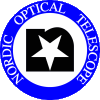
|
Next: Computers Up: AiC Report to NOT Previous: Telescope
InstrumentsThe last 6 months have been dominated by NOTCam commissioning work. Fortunately, during this time, few problems were experienced in other systems, the exception being hacker intrusions which caused some inconvenience but no lasting damage.
NOTCamSee accompanying report.
ALFOSCALFOSC has continued to serve the community as a reliable observing facility. During the period of 1/3/2001 - 1/9/2001 no technical downtime related to ALFOSC was recorded. In this period ALFOSC was used for 35 runs out of a total of 47 regular observing runs.
ALFOSC filtersSome more filter holders have been manufactured on-site, in order to accommodate large filters in the FASU wheels. IJAF have tested a new set of 90mm diameter Stromgren filters.
ALFOSC zero-point monitoringMore samples have been added to the UBVRI zero-points and colour terms. This information is accessible on our WWW pages.
ALFOSC long-slit spectroscopyMany updates have been made to the WWW documentation of ALFOSC spectroscopy. Optimal use of the existing grisms for echelle mode will be evaluated soon. The necessity of purchasing 2nd-order blocking filters is being investigated. The internal focus of the instrument has been checked recently.
A program to obtain standard stars for all grisms will be started. The standard star information will be incorporated in the WWW-based ALFOSC S/N estimator. This will allow potential users of ALFOSC in spectroscopic mode to estimate the required observing time when applying for time.
Some details of the control-room computer-system setup will be changed such that quick-look spectroscopic reduction scripts can be run just after the data have been taken.
ALFOSC multi-object spectroscopy (MOS)MOS target acquisition has been fully mastered, and can be achieved within a few to 10 minutes. High-quality slits are cut in plastic masks on our CNC machine in the service building on site. Initialization of the cutter height of the CNC machine is dificult and time consuming; this height needs to be set very precisely in order to get the correct slit width on the masks. This iterative process can take as long as 4-8 man hours, and we are looking into optimizing this initialization.
Nevertheless, MOS mode is fully operational, and has been advertised to the community as an efficient way to obtain numerous spectra. MOS mode is open for applications as of Oct 2001.
Half-wave plateA remotely-controllable half-wave plate mount is being manufactured at CUO/IJAF in order to allow spectroscopic calibration without the need to remove the entire assembly and to make observations involving repeated re-orientation more efficient.
TurPolNo change, continues to operate well.
HiRACEffectively retired, pending the arrival of the mosaic.
StanCamContinues to operate well.
FIESNo change pending further commissioning work.
MosaicFinal lab work is under way in Copenhagen. Delivery date unknown at this time.
FRedI defer to the director's report.
CCD Procurement
An order has been placed with Marconi for the purchase of two 2kx4k,
15
High speed CCD controller serial linkA Swedish undergraduate student, Bjarne Andersson, joined NOT for two months to work on the project under Graham Cox's supervision. Graham reports:
The purpose of this project was to continue work on the interface card been developed as part of the proposed array controller upgrade at CUO. The principle areas undertaken was the writing of VHDL (V. Hardware Description Language) for the PLD (Programmable Logic Device) on a prototype test board (also referred to as the dummy board) and the understanding of the programming of the PCI interface device (AMCC S5933) on the actual interface board.
Test code was written for the dummy board that made it act like a very simple array controller. Also after significant effort it was possible to program and operate the AMCC chip as a target device, and understand how to program it to act as a bus master, using a purchased driver package. At the end of the project period some work was still required to finish the PLD code and to finalize the AMCC operation and board functionality.
See accompanying report for greater detail.
Next: Computers Up: AiC Report to NOT Previous: Telescope Tim Abbott, AiC tabbott@not.iac.es |
||
|